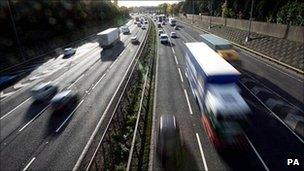Ministers to consult on 80mph motorway speed limit
- Published
- comments

The Department of Transport is to launch a consultation on increasing the speed limit on England and Wales' motorways from 70mph to 80mph.
Transport Secretary Philip Hammond said the current limit, introduced in 1965, was out of date due to "huge advances in safety and motoring technology".
The consultation begins this year with a view to raising the limit in 2013.
The Department for Transport says as many as 49% of drivers flout the current 70mph limit.
It says advances in technology have made cars much safer, contributing to a drop of more than 75% in the number of people killed on British roads since the 70mph limit was introduced.
As a result, it says it is time to look again at whether the current limit is "still appropriate".
But road safety charity Brake said it was opposed to any policy which could increase deaths on the road.
'Fast lane'
Mr Hammond said England and Wales' roads "should be the arteries of a healthy economy".
He added: "Now it is time to put Britain back in the fast lane of global economies and look again at the motorway speed limit which is nearly 50 years old, and out of date thanks to huge advances in safety and motoring technology.
"Increasing the motorway speed limit to 80mph would generate economic benefits of hundreds of millions of pounds through shorter journey times."
Mr Hammond also said that motoring technology has "moved on enormously" from when the original limit was introduced.
"Cars are much safer, they have more sophisticated equipment now than they did 40 or so years ago. They are capable of driving safely at higher speeds. There are enormous economic benefits to be had by increasing the speed limit and shortening journey times.
"And the current limit has lost its legitimacy. We all know that many, many motorists who are otherwise law-abiding citizens routinely ignore the 70 miles per hour limit."
Mr Hammond also said he did not think the rise would have a "significant impact on safety".
He added: "The experience in other countries where the limit has been raised, is that actually, the average increase in speed is really, very small.
"What we are doing here, is bringing a lot of drivers who currently, routinely break the speed limit, back on the right side of the law - and that has to be a good thing."
'Empty gesture'
The government says road safety remains a priority, and says it is taking action to tackle uninsured drivers and driving under the influence of alcohol or drugs.
BBC political correspondent Vicki Young said there had been some concerns within the cabinet about the change - Health Secretary Andrew Lansley is said to be concerned about road safety and and Energy Secretary Chris Huhne was worried about the pollution impact.
Professor Stephen Glaister, director of the RAC Foundation, said: "There are good reasons for making 80 the new 70, and good reasons not to. Drivers travelling that 10mph quicker might reach their destination sooner but will use about 20% more fuel and emit 20% more CO2.
"There is also likely to be a slight increase in road casualties. And what about enforcement? If police follow existing guidelines, many people could do 90mph before action is taken."
Stephen Joseph, chief executive of Campaign for Better Transport, said: "Increasing the motorway speed limit to 80mph would not help the economy and would increase costs for drivers.
"It would also add to pollution and increase road casualties. Responsible motorists know that driving steadily at or below 70mph is most fuel-efficient, reduces jams and is safer.
"This is an empty gesture that in the end would not benefit anyone."
Ellen Booth, senior campaigns officer at road safety charity Brake, said: "We are strongly opposed to the idea of raising the motorway speed limit.
"We would be strongly opposed to any policy that would increase deaths on the roads.
"To have such a policy would be unethical. Each death on the road affects not only the victim but their family too."
- Published11 May 2011
- Published20 April 2011
- Published11 April 2011
- Published9 April 2011